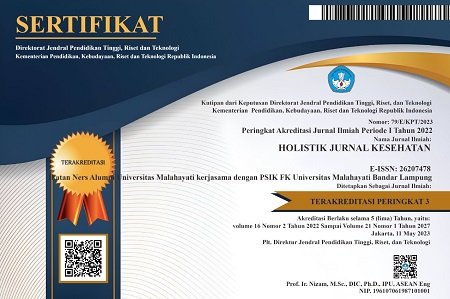Hubungan tingkat pengetahuan dan sikap masyarakat terhadap vaksinasi Covid-19
Abstract
Background: In December 2019, a series of acute atypical respiratory illnesses occurred in Wuhan, China. This disease in a short time spread rapidly from Wuhan to other areas. Cases of the coronavirus disease (covid-19). The covid-19 vaccine is one of the government's breakthroughs to fight and deal with covid-19 in the world, especially the State of Indonesia.
Purpose: To analyze the relationship between the level of knowledge and public attitudes towards the covid-19 vaccination.
Method: A quantitative study with a cross sectional design. The research population is the people of Posi Village, Bua District, Luwu Regency. Sampling using purposive sampling. Data was collected using a questionnaire instrument that was filled out independently by the respondents (self-reported). The data was processed using SPSS and analyzed in three stages, namely descriptive analysis to describe the general research problem. Bivariate analysis was carried out using the chi-square test to see the relationship between the level of knowledge and attitudes towards covid-19 vaccination by looking at the p-value. Multivariate analysis was carried out to see the most dominant factors associated with covid-19 vaccination using multiple logistic regression tests.
Results: Showing that the knowledge variable about covid-19 vaccination (p=0.005 < 0.05) means that there is a relationship between the level of knowledge and the history of the covid-19 vaccination. Attitude variable about covid-19 vaccination (p= 0.003 < 0.05) means that there is a relationship between attitude and history of covid-19 vaccination in the community of the two variables, the knowledge variable is the most dominant factor related to the covid-19 vaccination, namely a p-value of 0.012 with an Exp(B) / Odd Ratio of 0.378.
Conclusion: There is a relationship between the level of knowledge and attitude towards the history of covid-19 vaccination. Knowledge variable is the most dominant factor related to covid-19 vaccination.
Keywords: Knowledge; Attitude; Covid-19 Vaccine.
Pendahuluan: Pada bulan Desember 2019, serangkaian penyakit pernapasan atipikal akut terjadi di Wuhan, Tiongkok. Penyakit ini dalam waktu yang singkat menyebar cepat dari Wuhan ke daerah lain. Kasus penyakit coronavirus (COVID19). Vaksin Covid-19 merupakan salah satu terobosan pemerintah untuk melawan dan menangani Covid-19 yang ada di dunia khususnya Negara Indonesia.
Tujuan: Menganalisis hubungan tingkat pengetahuan dan sikap masyarakat terhadap vaksinasi covid-19
Metode: Penelitian kuantitatif dengan desain cross sectional. Populasi penelitian adalah masyarakat Desa Posi Kecamatan Bua Kabupaten Luwu. Penarikan sampel menggunakan Purposive sampling. Pengumpulan data dilakukan menggunakan instrumen kuesioner yang diisi secara mandiri oleh responden (self-reported). Data diolah dengan menggunakan SPSS dan dianalisis dengan tiga tahapan yaitu analisis deskriptif untuk menggambarkan secara umum masalah penelitian. Analisis bivariat dilakukan dengan menggunakan uji chi-square untuk melihat hubungan tingkat pengetahuan dan sikap terhadap vaksinasi covid-19 dengan melihat nilai p-value. Analisis multivariat dilakukan untuk melihat faktor yang paling dominan yang berhubungan dengan vaksinasi covid-19 menggunakan uji regresi logistic ganda.
Hasil: Variabel pengetahuan tentang vaksinasi covid-19 (p=0.005 < 0.05) artinya ada hubungan tingkat pengetahuan dengan riwayat vaksinasi covid-19. Variabel Sikap tentang vaksinasi covid-19 (p= 0.003 < 0.05) artinya ada hubungan sikap dengan riwayat vaksinasi covid-19 pada masyarakat. Dari kedua variabel tersebut variabel pengetahuan adalah faktor yang paling dominan berhubungan dengan vaksinasi covid-19, yaitu p-value 0,012 dengan Exp(B) / Odd Ratio sebesar 0,378.
Simpulan: Ada hubungan tingkat pengetahuan dan sikap terhadap riwayat vaksinasi covid-19. variabel pengetahuan adalah faktor yang paling dominan berhubungan dengan vaksinasi covid-19
Keywords
References
Andrews, J. L., Foulkes, L., & Blakemore, S. J. (2020). Peer Influence in Adolescence: PublicHealth Implications for COVID-19. Trends in Cognitive Sciences, 24(8), 585–587.
D’prinzessin, C. A. (2021). Hubungan Tingkat Pengetahuan Tentang Covid-19 Terhadap Tingkat Stres Dan Kecemasan Pada Mahasiswa Farmasi Universitas Sumatera Utara Angkatan 2017.
Fauziah, A. S. N., Fauzi, A. N., & Ainayah, U. (2020). Analisis Maraknya Perceraian Pada Masa Covid-19. Journal of Islamic Law, 4(2), 181-192
Febriyanti, N., Choliq, M. I., & Mukti, A. W. (2021). Hubungan tingkat pengetahuan dan kesediaan vaksinasi covid-19 pada warga kelurahan dukuh menanggal kota surabaya. SNHRP, 36-42. https://snhrp.unipasby.ac.id/prosiding/index.php/snhrp/article/view/168
Fitriani. A., Juwaeriyah, N., Ilman, A. N., Nurdini, N., Fadli, F., (2022). Pengetahuan, Sikap dan Penerimaan Vaksin covid-19 di Kabupaten Sidenreng Rappang. Jurnal Penelitian Kesehatan Suara Forikes, 13 (3): 772-776
Gallè, F., Sabella, E. A., Roma, P., De Giglio, O., Caggiano, G., Tafuri, S., Da Molin, G., Ferracuti, S., Montagna, M. T., Liguori, G., Orsi, G. B., & Napoli, C. (2021). Knowledge and Acceptance of covid 19 Vaccination among Undergraduate Students from Central and Southern Italy. Vaccines, 9(6), 638
Hutapea, M., Rizka, Y., & Lestari, W. (2022). Pengetahuan dan Sikap Masyarakat tentang Vaksin Covid-19 Berhubungan dengan Kesediaan untuk Dilakukan Vaksinasi Covid-19. Jurnal Penelitian Perawat Profesional, 4(3), 917-924. https://doi.org/10.37287/jppp.v4i3.1047
Li, Q., Guan, X., Wu, P., Wang, X., Zhou, L., Tong, Y., Ren, R., Leung, K. S., Lau, E. H., Wong,J. Y. and Xing, X. (2020). Early transmission dynamics in Universitas Sumatera Utara 51 Wuhan, China, of novel coronavirus–infected pneumonia. New England Journal of Medicine, 382(13):1199-1207
Nirwan, N. (2021). Hubungan Tingkat Pengetahuan dan Kecemasan Masyarakat terhadap Vaksinasi Covid - 19 Di Desa Puncak Indah Kecamatan Malili Kabupaten Luwu Timur Tahun 2021. Jurnal Kesehatan Luwu Raya, 8(1), 63-68.
Notoatmodjo, S. (2012). Promosi kesehatan dan perilaku kesehatan.
Notoatmodjo, S. (2012). Metodologi Penelitian Kesehatan, Jakarta, PT Rineka Cipta. Profil SMA, 2.
Nugroho, S.A, Istiqomah B, Rohanisa F. (2021). Hubungan Tingkat Pengetahuan dan Self Efficacy Vaksinasi Covid-19 pada Mahasiswa Fakultas Kesehatan Universitas Nurul Jadid. Jurnal Keperawatan Profesional (JKP), 9(2).
Nurdiana, A., Marlina, R., Adityasning, W. (2021). Berantas Hoax Seputar Vaksin covid-19 Melalui Kegiatan Edukasi dan Sosialisasi Vaksin Covid-19. Jurnal Pengabdian Masyarakat, 4(1), 489-495
Nurkholis, N. (2020). Dampak Pandemi NovelCorona Virus Disiase (Covid-19) Terhadap Psikologi Dan Pendidikan Serta Kebijakan Pemerintah. Jurnal PGSD, 6(1), 39-49.
Sagitarini, P.N & Agustini N.K.T. (2022). Pengetahuan dan sikap remaja tentang protokol kesehatan di masa new normal. Holistik Jurnal Kesehatan, 16(4),326-332.
Sembiring, E. E., & Meo, M. L. N. (2020). Pengetahuan dan sikap berhubungan dengan resiko tertular COVID-19 pada masyarakat Sulawesi Utara. NERS Jurnal Keperawatan, 16(2), 75-82.
Solís Arce, J. S., Warren, S. S., Meriggi, N. F., Scacco, A., McMurry, N., Voors, M., & Omer, S. B. (2021). COVID-19 vaccine acceptance and hesitancy in low-and middle-income countries. Nature medicine, 27(8), 1385-1394.
Usman, U., Budi, S., & Sari, D. N. A. (2020). Pengetahuan dan sikap mahasiswa kesehatan tentang pencegahan COVID-19 di Indonesia. Jurnal Ilmu Keperawatan Dan Kebidanan, 11(2), 258-264.
Widjaja, J. T., Nathania, E., (2022). Perbandingan Pengetahuan, Sikap, dan Keikutsertaan Tenaga Kesehatan dan Masyarakat Umum di Rumah Sakit Immanuel Bandung terhadap Vaksin Covid-19. Journal of Mdicine and Health, 4(1): 46-55
Xiao, Y., & Torok, M. E. (2020). Taking the right measures to control covid-19. The Lancet Infectious Diseases, 20(5), 523-524.
DOI: https://doi.org/10.33024/hjk.v16i5.8259
Refbacks
- There are currently no refbacks.
Copyright (c) 2022 Holistik Jurnal Kesehatan

This work is licensed under a Creative Commons Attribution-NonCommercial 4.0 International License.














